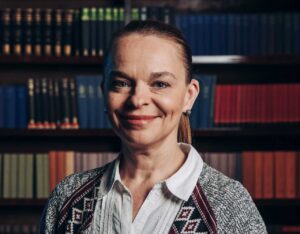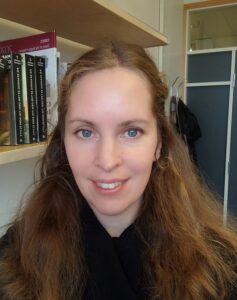Keynote speakers
Thursday May 4th at 10.15–11.00 (ARC 1, Arcanum, 1. floor): Viola Parente-Čapková, Turun yliopisto.
Thursday May 4th at 11.00–11.45 (ARC 1, Arcanum, 1. floor): Lovisa Andén, University of Tromsø & Åbo Akademi.
Friday May 5th at 12.00–12.45 (Armfelt A102, Arken 1. floor): Colin Davis, Royal Holloway, University of London.
Presentation: Viola Parente-Čapková

Viola Parente-Čapková is Professor at the Department of Finnish Literature at the University of Turku, Finland, and she is also Associate Professor of Theory of Literature at Charles University, Prague, Czech Republic. She is the leader of the research projects “Texts on the Move: Reception of Women’s Writing in Finland and Russia 1840– 2020” and “Struck by the Unknown: Fiction as a promoter of the Finnish language among adults with im/migrant background”. Her research interests include the theory of literary history, feminist literary theory, fin de siècle literature, transnational literary studies, digital humanities, and cultural language learning.
Abstract of the keynote lecture: Shared Reading as Experience Formation: Using Literature?
Reading experience has been researched and defined in various ways and contexts, as an emotional, intellectual, or even physical event. The role of language in reading experience has been recognized, but the way reading experience is connected to language acquisition and becomes a formative experience have not been brought up within literary studies. In my paper, I reflect on the shared reading experience of adult learners of Finnish with academic backgrounds in reading circles organized by the research project Struck by the Unknown: Fiction as promotor of the Finnish language among adults with im/migrant background. In the reading experience connected to cultural language learning in a reading circle, it is
impossible to separate cognitive processes and emotions from intellectual event. An appropriate venue to explore the cognitive, emotional, and intellectual together is a reading circle, where aesthetic experience permeates a learning process. I will bring up some facets of shared reading as experience formation by reporting on how our research team and our
reading circle participants experienced the project. Facets of this shared reading experience include a dialogical transborder approach that creates space to articulate emotions. Finally, I reflect on the issue of using or instrumentalizing literature.
Presentation: Lovisa Andén

Lovisa Andén is Associate Professor of Philosophy at the University of Tromsø, the Arctic University of Norway. Her research examines questions of representation, truth, and experience in testimonial literature. She is currently conducting the research project, Muted Memoirs and Silenced Stories: Memoirs by Women of the Gulag Archipelago, at Åbo Academy University. She has previously worked on the relation between literature, experience and meaning in the phenomenology of Maurice Merleau-Ponty. In 2017, she defended her thesis, “Litteratur och erfarenhet i Merleau-Pontys läsning av Proust, Valéry och Stendhal, at Södertörn University/Uppsala University”. Together with Franck Robert and Emmanuel de Saint Aubert, Andén has transcribed, edited, and published Merleau-Ponty’s handwritten manuscripts to his course at the Collège de France 1953-1954, “Sur le problème de la parole” (On the Problem of Speech), published by MetisPress 2020.
Abstract of the keynote lecture: Narration and Self-Representation in Women’s Testimonial Literature from the Gulag Archipelago
All testimonial literature makes a certain claim to truth. The writer appeals to the reader to believe her, to believe that she is telling it “as it really was”. However, the notion of truth in testimonial literature is ambiguous because this kind of testimonies can be said to be true in two different senses: first of all, it can be true in terms of accuracy and, second, it can represent the true meaning of the experience. If we understand truth in testimonial literature as a narrative that is somehow true to the meaning of the experience, we must ask how a meaningful discourse is conditioned on the one hand by self-representation, and, on the other by the possibilities to be understood and believed. I explore how those conditions are significantly, different for women and for men, for repatriated Europeans and for Soviet survivors.
Almost one million Europeans were deported to the Far East and the Great North, to Siberia and to the Urals between 1939-1950. Even though men outnumbered women in the Gulag camps, women and children constituted the majority of those deported. Furthermore, even when women lived in the same camps as men, their experiences were different, and so were their possibilities to narrate their experience. I discuss how testimonial literature written by women who survived the Gulag are conditioned by a silence that has only been partially broken, by traumas that has not been recognized as such and experiences that has yet to be acknowledged.
Presentation: Colin Davis

Colin Davis is Emeritus Professor of French and Comparative Literature at Royal Holloway, University of London, UK, having previously held posts in Cambridge, Oxford and Warwick He has also been Visiting Professor at the Ecole Normale Supérieure – Lettres et Sciences Humaines, Lyon, France, the University of Indiana, Bloomington, USA, and the University of Turku. In 2021 he was appointed as Chevalier dans l’Ordre des Palmes académiques by the French government. His research focuses mainly on connections between literature, film and philosophy, with particular interests in the modern French novel, ethics, ethical criticism, philosophical approaches to literature and film, hermeneutics, literary theory, cultural memory, trauma studies and Holocaust literature. His most recent books are Traces of War: Interpreting Ethics and Trauma in Twentieth-Century French Writing (2018), The Routledge Companion to Literature and Trauma, co-edited with Hanna Meretoja (2020), and Silent Renoir: Philosophy and the Interpretation of Early Film (2021).
Abstract of the keynote lecture: The Experience of Reading
We bring our past experiences with us when we read a literary work; it constitutes a new experience for us whilst we read it, and it may have a continuing effect on us in our subsequent attitudes and behaviour. But these different aspects of the experience of reading are difficult to describe because our engagements with literature are unruly and unpredictable. Reading is influenced by cultural norms and shared expectations, but it is also private and idiosyncratic. One reader might be deeply moved by a particular work, whilst another is profoundly bored. The experience of reading is too wayward to encourage any endeavour to regulate or foresee its outcome. So why do some of us continue to insist that literature matters, not just to us as individuals, but also to society more generally, and to the cultivation of the values we hope to uphold? The plethora of passionate defences of literature suggests both an urgent sense that we need to proclaim the importance of reading and that we are still failing to find the final argument that will convince prospective students, university authorities and sceptical funding bodies. This paper looks at some recent accounts of why literature matters, particularly focussing on attempts to understand how reading might, or might not, help develop our better selves. The persistent danger is that we are speaking only to those who are already inclined to listen. The paper offers no decisive solution to these problems, but this should not (yet) be taken as a counsel of despair.
